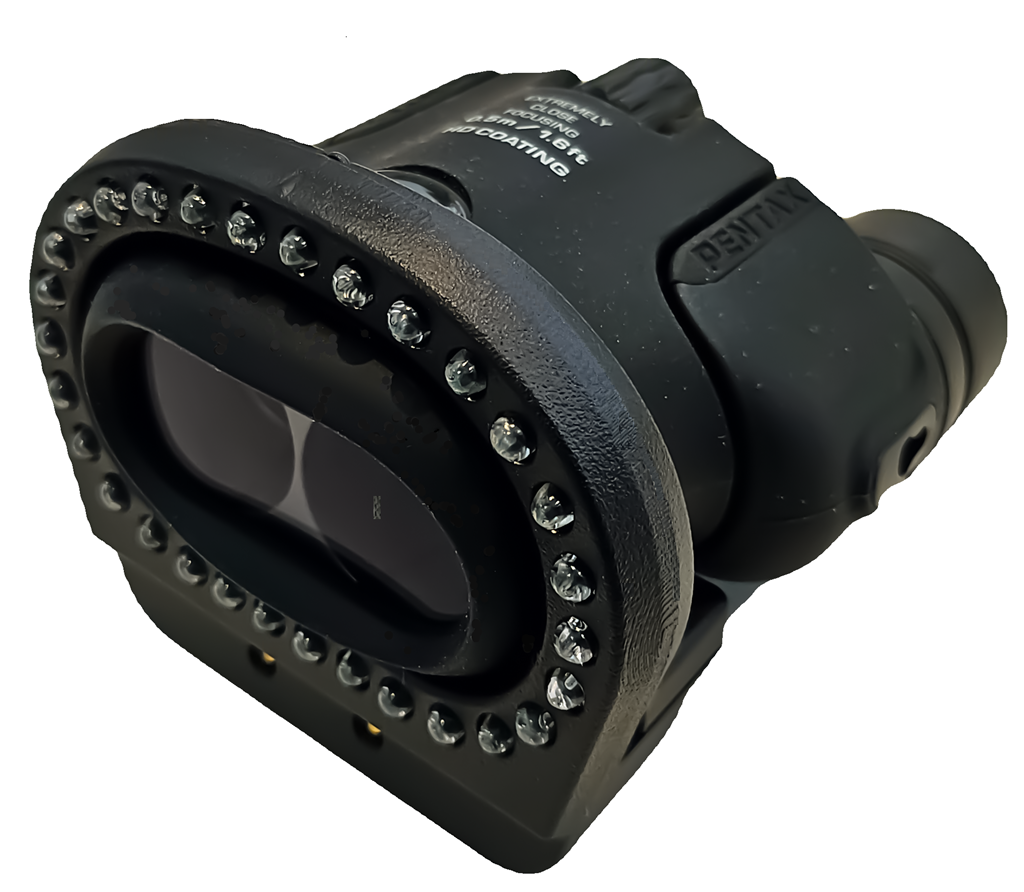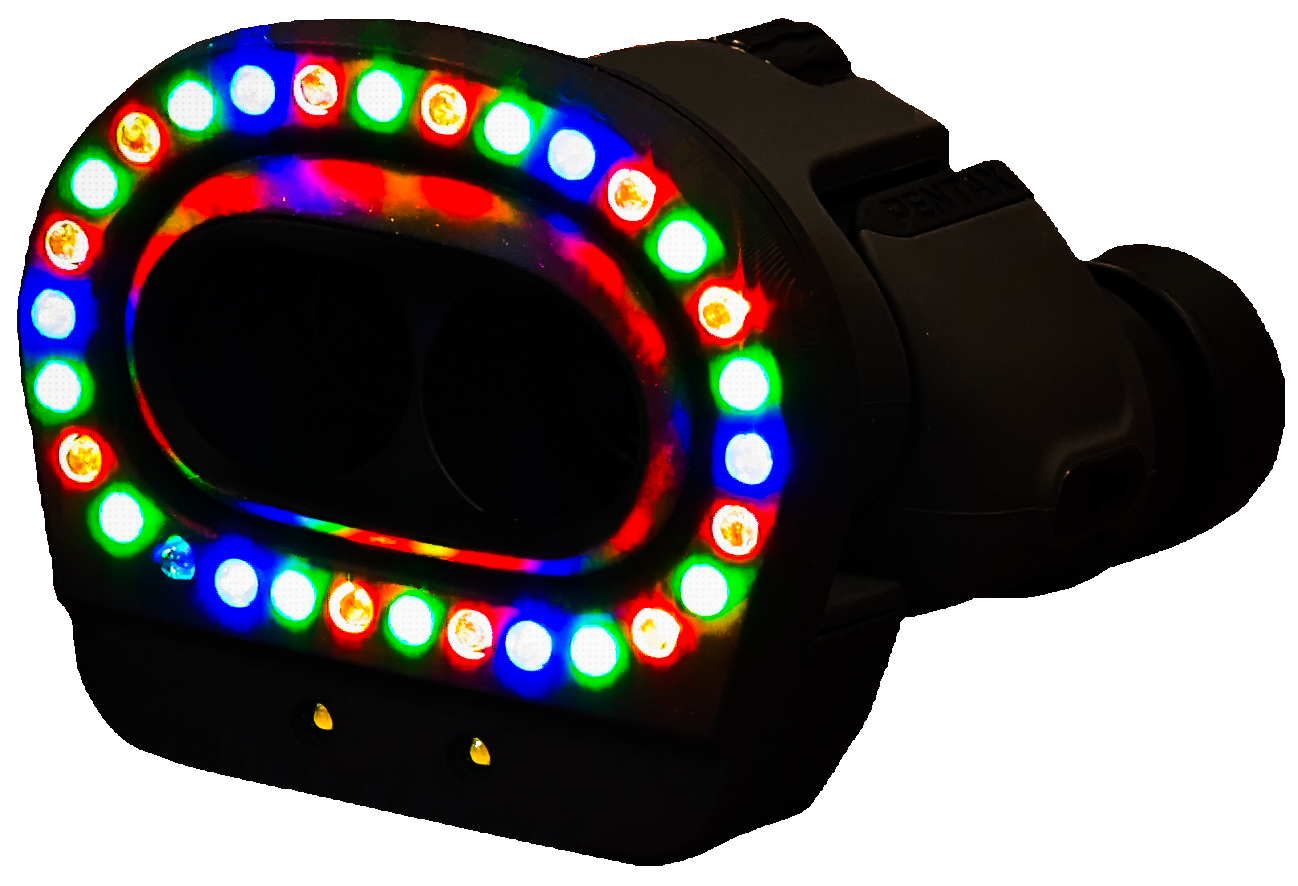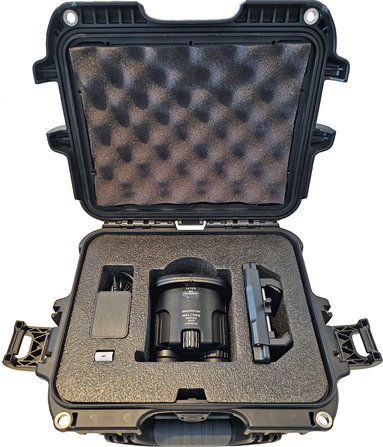
The IRIS T1 utilizes the latest technology with an advanced proprietary design to offer a comprehensive optical covert camera detection solution. We have taken years of in-field experience along with input from professional operators from both government and private sectors to create a unique product, with a wide range of features.
Our design process began with field testing a series of binocular models. We wanted portable and light weight characteristics with ease of use and high-quality optics. While there are a variety of binoculars that exhibit these qualities, the latest updated Pentax Papilio III WR has been selected for its minimum focusing range of only 0.5 meters . This allows the operator to maintain full use of the device in smaller spaces as well as in environments that require use over greater distances.
The latest Pentax Papilio III WR features a newly adopted high-performance HD Coating which has been applied to optical elements already treated with full multi-coating. Compared with conventional multi-coatings, this assures higher transmittance with less reflection. The result is that the Papilio III WR delivers extra-clear, higher-contrast images even under such demanding conditions as backlighting. The Papilio III WR also features specialized anti-stain coatings applied to the eyepieces and front plate-glass surfaces to minimize the adhesion of dust and stains.
Note: The IRIS T1 comes standard with the Pentax Papilio III WR 6.5 X 21 magnification and 7.5 degree field of view version. However, customers can specify the 8.5 X 21 magnification version with a 6 degree field of view , if preferred, at the time of order.
With the choice of binocular easily made, we were then able to concentrate on the heart of the system, the camera lens detection LED light array. The unique outer ring/perimeter LED light array design provides a lighter, more compact product, with increased performance and extended features. With 30 high intensity narrow focused RGB LED lights, two high intensity wide angle white LED lights, variable LED light intensity, and 14 modes of modes of operation, the IRIS T1 is designed specifically for professional operators, allowing extensive customization for different operational applications and personal user preferences.

LED Perimeter Light Array
The IRIS T1 proprietary 30 LED perimeter light array incorporates 12 red, 12 green, and 6 blue LED lights. The LED light array is positioned so it does not extend beyond the binocular lenses to avoid a negative impact on the field of view, leaving the binocular lenses open and unobstructed. The LED light array design also keeps overall unit as compact, lightweight, and efficient as possible, weighing a total of 407 grams.
LED’s

The 30 red, green, and blue LEDs used in the LED light array are all high intensity with a narrow focused beam to keep light energy directed toward the area of inspection, for the brightest performance while providing increased detection capability at longer distances. The LED light array alignment and pattern were also analyzed to ensure a high degree of accuracy along the X and Y axis.
Blue Light
When incorporating blue light into the LED light array, we wanted to integrate it in a way that would be most effective. Blue light is the most difficult for the human eye to focus on and scatters quickly. When using a camera lens detector, you are not looking for large areas of colour, but in most cases a small dot or pinpoint of light. Our testing showed that blue light was most effective at close range to approaching medium range. However, red and green light were more effective at greater distances. With this in mind, we didn’t want to incorporate blue light at the risk of limiting the range of red and green, so we place 6 high intensity, narrow focused blue LED lights at equal distances around the LED light array for use at close to medium range applications. This allowed us to increase the number of red and green LEDs to 12 each, for a total of 24. This set up offers the benefits of blue light while increasing the performance and range for both red and green light.
LED Light and Mode Selection
When designing the IRIS T1 a variety of operating modes were evaluated, while input provided indicated individual preferences. Flashing modes could be too distracting and difficult on the eyes, and some preferred a constant on/solid mode. There are also individuals who may have certain sensitivities to flashing or strobe type effects. With these factors in consideration, we included a series of modes allowing users to customize the IRIS T1 operation for specific environments and user preferences. Operators can choose each individual RGB colour separately, a combination of red/green for greater distances, or a combination of red/green/blue. Within each of these colour options, the operator can select the available modes of operation including constant on/solid, pulse, alternating, or rotation. The IRIS T1 automatically saves the current programmed settings when powering down, and will power up again in the same previous configuration.
Our newly implemented, ‘rotation mode’ is specifically designed by R&R Inteltech for use with all three LED light colours and provides a unique form of visual detection. The rotation speed is optimized so the pattern can be identified in the reflection from the camera lens through the binoculars. This mode involves individual LED lights being powered one at a time in sequence around the perimeter LED light array, which drastically lowers the brightness compared to multiple lights being activated at once. This works to minimize or even eliminate the glare and unwanted reflections that can be produced during normal operation, and provides an effective means to verify a potential detection. The rotation mode is most effective when used in dark environments, or at close target distances during a search or detection verification in environments with normal to high ambient lighting conditions.
Variable Intensity
LED lights operating at high intensity can be very bright, making it uncomfortable for the eye, while creating substantial glare off different surfaces. Considering both personal vision limitations and lighting conditions in different environments, we incorporated a variable intensity feature which allows the operator to adjust the brightness with 10 different levels of LED intensity to their personal preference and specific target environment.

White LEDs
In addition to the 30 RGB colour LEDs, there are two high intensity wide angle white LEDs located at the bottom of the light array. The white LEDs are activated separately and can be used as a torch, eliminating the need for a flashlight in low light environments. The white LEDs can also be used to quickly light up a target area for visual evaluation of a suspected detection. When the white LED’s are activated the RGB LEDs are temporarily disabled, and then resume in the same configuration once the white LEDs are deactivated.
IRIS T1 Operation and Control Ergonomics

When designing the IRIS T1, we wanted to ensure the most seamless and intuitive user experience. To accomplish this, we implemented a 5-button control panel on the bottom of the unit. The layout places the buttons where the thumbs naturally rest during operation. This allows the user to change or move between settings without taking their eyes off a potential target.
A simple on/off system is implemented, where pressing and holding any button for one second turns the unit on or off. This helps in dark environments or when wearing gloves. This feature has been professionally engineered and produces virtually zero battery drain when turned off, while limiting the use of mechanical parts prone to normal wear and failure.
The 5 buttons on the panel include, one to control the LED colour selection mode, one to control the LED operation mode, one to control the white LEDs, and two at the back of the panel to scroll up and down through the 10 intensity levels.
Battery and Operation Status Indication
The IRIS T1 battery is charged via a USB port. A small light next to the charging port indicates the current operating battery status. The efficient battery provides power on a single charge for up to 5 hours with all 30 LED’s powered at 100% intensity, to as much as 10 hours or more depending on the operating modes selected.
The IRIS T1 also includes a sleep mode feature. If no button has been pressed for 45 minutes, the LED drivers will shut down. This helps to save battery power in the event the unit is accidentally left powered on while not in use.
Cellular Phone Adapter
The IRIS T1 kit includes an adapter to attach a cellular smartphone to the binocular eyepiece for taking photographs or video of positive detections, as well as for reporting and documentation purposes. The adapter also allows operators to use the cellular phone screen for viewing a target area, which can be beneficial to individuals that find looking through binoculars uncomfortable, or for use during extended periods of time.

Full Kit with Transport / Storage Case
The IRIS T1 comes with a Nanuk hard shell case which has been custom designed to fit the IRIS T1, USB charging cable, cellular phone camera mount, lanyard, and operator manual. Nanuk cases are MIL-SPEC, IP 67 rated, and are manufactured and tested in Canada.
Specifications
| Binocular | Pentax Papilio III WR (latest version) |
| Magnification | 6.5X – Default / 8.5X – model variation by request |
| Field of view | 7.5 Degrees / 6.0 Degrees |
| Focusing range | 0.5m to infinity |
| Illumination type | LED |
| Number of LEDs | 32 (12 red, 12 green, 6 blue, 2 white) |
| Illumination modes | Red, Green, Blue, Red/Green, Red/Green/Blue, white only |
| Operation modes | Solid, Pulse, Alternating, Rotation |
| LED intensity | 10 levels |
| Power | Internal 3.7 V Li-ion rechargeable battery |
| Charging type | USB type C 5V @ 2A |
| Charging time | ~ 2 hrs |
| Operation time (with battery at full capacity) | Up to 5hrs -10hrs or more depending on selected operational settings |
| Sleep Mode | After 45 minutes with no button pressed |
| Battery status indicator | RGB LED next to USB port |
| Operating temperature | -20C to 40C |
| IRIS T1 Weight | 407grams |
Warranty: The IRIS T1 is guaranteed from manufacturing defects for a period of 12 months from the date of purchase.
*The IRIS T1 is designed and manufactured in Canada.
